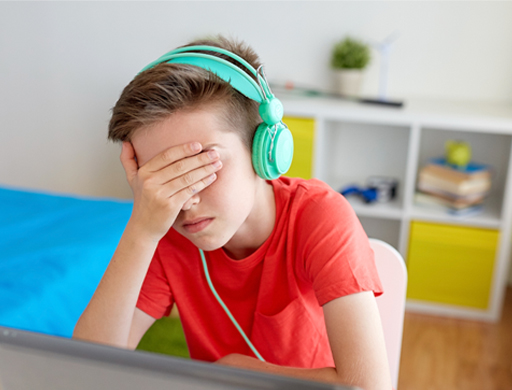1.1 The risks of social media for children
The effects of social media on older children’s mental health is of concern, which has been borne out by research by Viner et al. (2019).
Activity _unit9.1.1 Activity 1 Identifying the risks of social media for young children
Make a list of the ways that you think social media, and the internet more generally, can be unhelpful in relation to children’s mental health and wellbeing.
Discussion
The possible impacts of social media and the internet on children’s mental health might include:
- The effect of being exposed to cyberbullying or receiving inappropriate unsolicited messages from adults who are strangers.
- Being able to access problematic websites that promote self-harm and eating disorders. Seeing such information can normalise behaviours for children when they are particularly impressionable.
- An increased risk of developing poor body image because the constant use online of ‘beautiful’ bodies is thought to be linked to lower body esteem and body surveillance (Frith, 2017).
- A greater risk of being exposed to pornographic material and content that promotes violence and intolerance.
- Addiction: children who spend a great deal of time on social media, and the internet more generally, run the risk of becoming addicted to its use. Hoffmann et al. have gone as far as to assert that ‘social media is more addictive than cigarettes and alcohol’ (cited in All Party Parliamentary Group, 2018, p. 66). But it is worth remembering that something can be highly addictive (like caffeine) and not have major negative consequences in the same way as alcohol and other drugs.
As well as affecting young children’s mental health, social media can impact on physical health because:
- The lack of sleep that children and young people experience when using the internet and social media late into the night can lead to tiredness, irritability and a general lack of energy.
- Engaging with the internet and social media can mean that there is less time for taking exercise, so children are being deprived of the positive effects on wellbeing that are associated with exercise.
Viner et al.’s (2019) findings, which were published in The Lancet: Child & Adolescent Health journal, were taken from a study carried out involving 866 children aged 13–16 in England. They concluded that children who ‘frequently use social media’ (defined as ‘used multiple times daily’) are significantly more likely to experience mental health problems, and that the situation is probably worse for girls than it is for boys. The researchers suggested that exposure to cyberbullying or displacement of sleep or physical activity as a result of very frequent social media use could explain the increased risk. The findings from Viner et al.’s study highlight the importance of ensuring that early work occurs to help avoid the negative impact of social media on children’s mental health. Such interventions should include measures to increase resilience to cyberbullying, as well as ensuring children receive adequate sleep and physical activity. You will return to these points later in this session.
Although the negative effects of screen time, including social media use, are discussed extensively, it is important to consider the benefits of screen time, the internet and social media for older children. You will look at this briefly in the next section.

